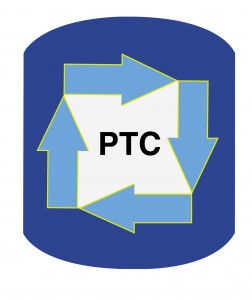US Patent 8,357,822 addresses an issue rarely discussed in PTC systems which is separation of the phase-transfer catalyst from the product when the organic phase is run through a thin film evaporator at the end of the reaction.
The key point in the patent is that when the catalyst is chosen to be an ionic liquid, such as certain tetraalkyl phosphonium salts, “no adhesion of the catalyst due to the solidification thereof was observed in the thin film distillation unit”. Conversely, when the catalyst chosen has a melting point higher than the wall temperature of the thin film evaporator, then it will obviously solidify on the wall and cause problems.
The reaction discussed was the equilibration of triethyl phosphite with phosphorous trichloride to form diethyl chloro phosphite (homogeneous, not PTC). At the end of the reaction, the reaction liquid was fed continuously into the thin film distillation unit with a wall surface maintained at 80 deg C. Several phosphonium salts were screened. Those that were liquids at 80 deg C (they measured and reported their viscosities at this temperature) gave high yield. In one case, tetrabutyl phosphonium bromide was used which is a solid at 80 deg C. The yield dropped from 96% when using three ionic liquid phosphonium salts to 74% when using tetrabutyl phosphonium bromide since “adhesion of the catalyst due to the solidification thereof was observed in the thin film distillation unit.”
If you would like to learn about effective separation of the phase-transfer catalyst from the product, be sure to attend our 2-day course “Industrial Phase-Transfer Catalysis” that describes in detail the various methods of separation. If you have a more immediate need for expertise in catalyst separation, inquire about PTC Process Consulting.
About Marc Halpern

Dr. Halpern is founder and president of PTC Organics, Inc., the only company dedicated exclusively to developing low-cost high-performance green chemistry processes for the manufacture of organic chemicals using Phase Transfer Catalysis. Dr. Halpern has innovated PTC breakthroughs for pharmaceuticals, agrochemicals, petrochemicals, monomers, polymers, flavors & fragrances, dyes & pigments and solvents. Dr. Halpern has provided PTC services on-site at more than 260 industrial process R&D departments in 37 countries and has helped chemical companies save > $200 million. Dr. Halpern co-authored five books including the best-selling “Phase-Transfer Catalysis: Fundamentals, Applications and Industrial Perspectives” and has presented the 2-day course “Practical Phase-Transfer Catalysis” at 50 locations in the US, Europe and Asia.
Dr. Halpern founded the journal “Industrial Phase-Transfer Catalysis” and “The PTC Tip of the Month” enjoyed by 2,100 qualified subscribers, now beyond 130 issues. In 2014, Dr. Halpern is celebrating his 30th year in the chemical industry, including serving as a process chemist at Dow Chemical, a supervisor of process chemistry at ICI, Director of R&D at Sybron Chemicals and founder and president of PTC Organics Inc. (15 years) and PTC Communications Inc. (20 years). Dr. Halpern also co-founded PTC Interface Inc. in 1989 and PTC Value Recovery Inc. in 1999. His academic breakthroughs include the PTC pKa Guidelines, the q-value for quat accessibility and he has achieved industrial PTC breakthroughs for a dozen strong base reactions as well as esterifications, transesterifications, epoxidations and chloromethylations plus contributed to more than 100 other industrial PTC process development projects.
Dr. Halpern has dedicated his adult life to his family and to phase-transfer catalysis (in that order!).

